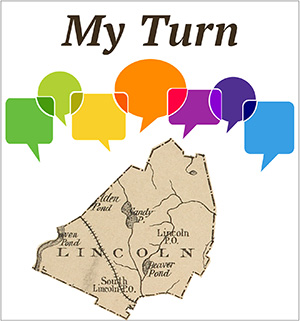By Barbara Slayter and Joan Kimball
On Saturday, Oct. 5, State Sen. Michael Barrett spoke to an attentive audience at Bemis Hall on “The State of the Environment in Massachusetts.” The Lincoln Democratic Town Committee chaired by Joan Kimball and Travis Roland hosted the event, whose attendees included environmental activists from 350 MASS, Mothers Out Front, Lincoln’s Green Energy Committee, and Stop Private Jet Expansion at Hanscom or Anywhere.
Barrett — who is Assistant Majority Leader, chair of the Joint Committee on Telecommunications, Utilities and Energy and vice chair of the Senate Committee on Global Warming and Climate Change — reflected on the state’s key issues in environmental policy making, the best ways to address them, and what we as Massachusetts citizens can do to move the process along.
The state Senate passed sweeping climate legislation” in June and the House has also passed its own climate change bill. However, the legislative session closed July 31 without a joint bill coming out of the Conference Committee. How might be moved forward?
The context for getting a climate bill passed
According to Sen. Barrett, central to advancing clean energy policies are questions about how to “upsize” electricity and “downsize” gas as Massachusetts strives to implement a clean energy economy as expeditiously as possible. The pace and the cost of this effort affect stakeholders differently.
Stakeholders have strong opinions on energy sources and how it’s provided, how much we focus on EVs, solar canopies, heat pumps or recycling throwaway plastics, carbon pollution and more. Rate payers worry about the cost of energy, especially the construction of the electric grid; businesses focus on investment profitability; and the legislature and administration are concerned about the price tag and about balancing various interests and needs.
Climate legislation
The climate omnibus bill approved last June aims to upgrade the grid and protect rate payers. The bill deals not only with siting and permitting needed to move Massachusetts away from polluting fossil fuels to more reliance on electricity, but also on reduction of plastics and other toxins such as PFAS that are polluting our environment.
Decisions about gas — The bill’s intent is to slow down the momentum for constructing new gas structures. Currently there is a huge economic incentive for the gas companies to replace pipes, as they make much more profit on construction work than on selling gas. At present the DPU is authorized only to “repair” and “replace” pipes. The Senate bill would allow “repair, replace or retire” so that new pipes lasting well beyond 2050 would not be constructed.
Decisions about Massport — An issue of great concern to Lincoln residents is the plan to expand Hanscom Airport to accommodate private jets. In 1956, the legislature passed the Massport charter for the independent authority with the goal of increasing air transportation. The Senate version of the climate bill provides for amending that charter to require that Massport consider Massachusetts mandates for addressing global warming and climate change as part of all its decisions.
Lincoln residents vigorously support the Senate bill’s provision to update the Massport charter. Times have changed since 1956, and Massachusetts is a leader in addressing problems caused by global warming and climate change. Research has shown that this airport expansion would significantly worsen carbon pollution.
How to pass this legislation?
Barrett strongly supports passage of a comprehensive bill by the Senate and House conference committee. He hopes that this can be accomplished in a formal session rather than an informal session this fall when the legislature may be called back into session to complete unfinished work. If discussed in an informal legislative session, any legislator can stop the legislation from proceeding using parliamentary rules in place.
House and Senate negotiators including Barrett and Rep. Jeffrey Roy of Franklin are optimistic that they can come to some sort of agreement. Barrett, who had all but given up hope for a larger bill after the governor filed her closeout spending bill, recognizes that not everything is aligned quite yet, but with effort, the committee can emerge with a deal
What can we do?
Barrett urged citizens to pressure the House and the Senate to resolve differences in their two bills. Lincoln’s two representatives, Carmine Gentile and Alice Peisch, have been supportive of this climate legislation, said Barrett, urging attendees to “put the pressure on… It makes a difference when I can go to the Senate and make a strong case that this is what citizens in my community want. The same will be true for your representatives in the Massachusetts House.”
In sum:
- Write or call your Massachusetts representatives to urge them to move the clean energy agenda forward in a compromise climate bill resulting from the House and Senate negotiations this fall.
- Respond to the Lincoln Democrats’ call to action — a group letter advocating a compromise climate bill from House and Senate negotiations or contact the LDTC at selenejck@gmail.com.
- Write or call state senators and representatives asking them to update the Massport charter to reflect current climate concerns and priorities
- Look for an elaboration of Sen. Barrett’s reflections in his newsletter, The Barrett Report, which explores in detail many of the issues surrounding a clean energy agenda that were presented in his talk.
“My Turn” is a forum for readers to offer their letters to the editor or views on any subject of interest to other Lincolnites. Submissions must be signed with the writer’s name and street address and sent via email to lincolnsquirrelnews@gmail.com. Items will be edited for punctuation, spelling, style, etc., and will be published at the discretion of the editor. Submissions containing personal attacks, errors of fact, or other inappropriate material will not be published.

Leave a Reply